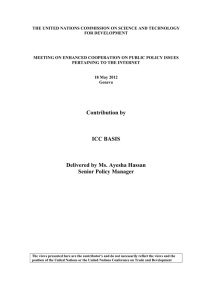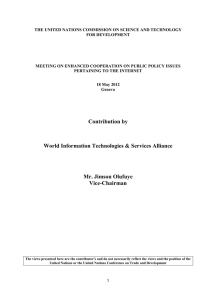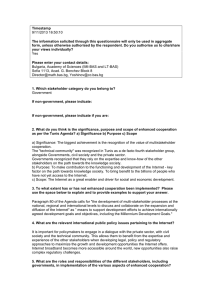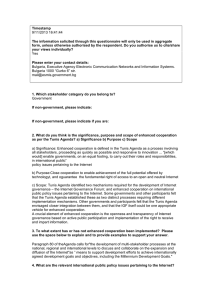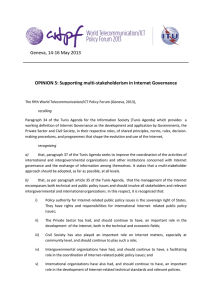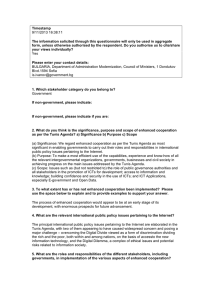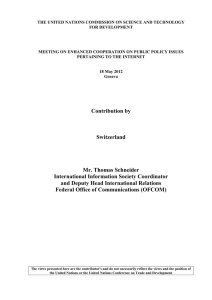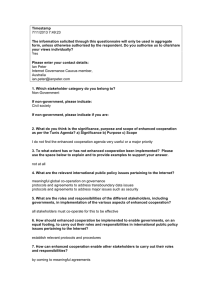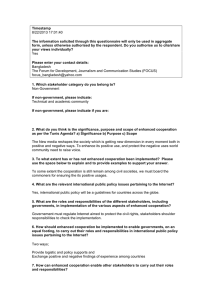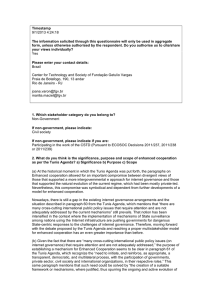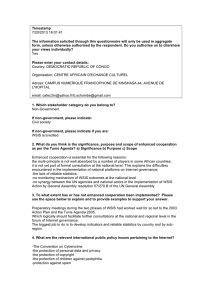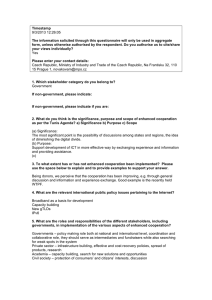THE UNITED NATIONS COMMISSION ON SCIENCE AND TECHNOLOGY FOR DEVELOPMENT
advertisement
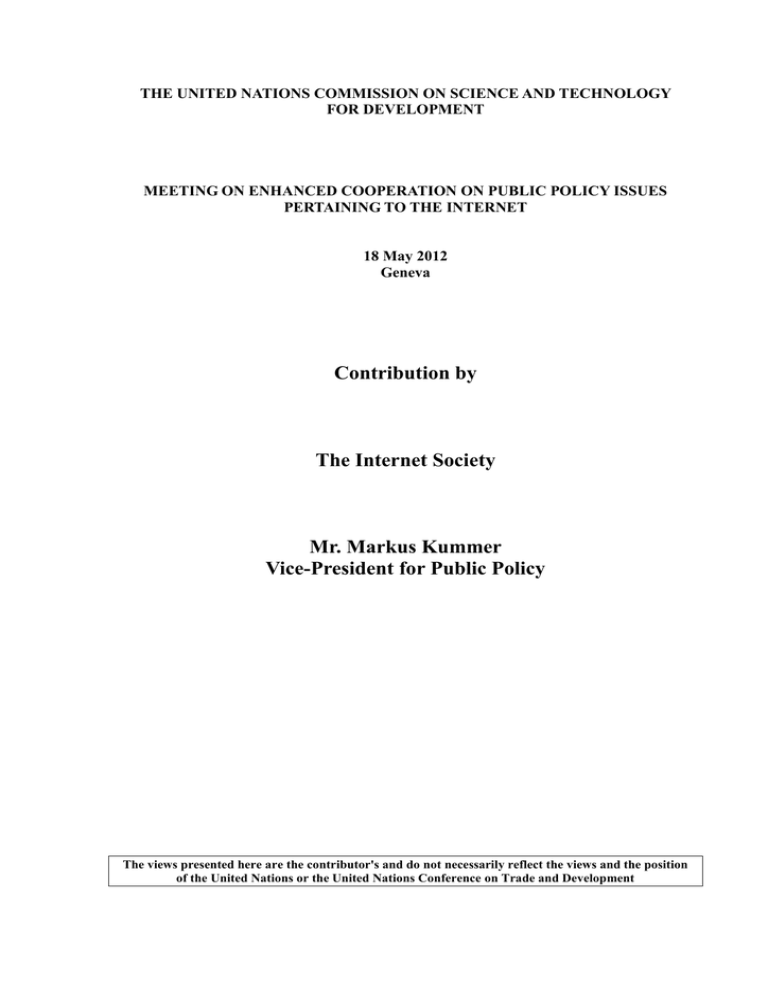
THE UNITED NATIONS COMMISSION ON SCIENCE AND TECHNOLOGY FOR DEVELOPMENT MEETING ON ENHANCED COOPERATION ON PUBLIC POLICY ISSUES PERTAINING TO THE INTERNET 18 May 2012 Geneva Contribution by The Internet Society Mr. Markus Kummer Vice-President for Public Policy The views presented here are the contributor's and do not necessarily reflect the views and the position of the United Nations or the United Nations Conference on Trade and Development CSTD meeting on enhanced cooperation on public policy issues pertaining to the Internet 18 May 2012 Statement by Markus Kummer, Vice-President for Public Policy, The Internet Society I am very honored to be part of this panel and I look forward to engaging in a constructive dialogue. It is nearly ten years ago that we started the WSIS process and we have come a long way. In July 2002 non-governmental stakeholders banged at the door of the Geneva Conference Centre and asked to be let in. Today, multistakeholder cooperation is the norm. The Internet Society, in its past contributions on ‘enhanced cooperation’, always made sure to stress the importance of multi-stakeholder cooperation. Multistakeholder cooperation is essential to the growth of the Internet and the Information Society. In our view it is not an option – it is a must! When discussing Internet governance, it is important to keep in mind some of the key characteristics of the underlying architecture of the Internet. The Internet is a network of networks, characterized by shared global ownership without central control. It is engineered for innovation around some architectural fundamentals and based on open and interoperable standards. The Internet allows for innovation without permission and the intelligence of the network is at the edges. These basic architectural principles have produced an unprecedented and sustained growth of technical, economic and social innovation, bringing benefits to all. The Internet governance arrangements in place reflect the distributed nature of the Internet. There is no single organization “in charge of the Internet”. These arrangements are also known as the Internet model or the Internet eco-system. They function through the engagement of all relevant stakeholders in many organizations. In short, the Internet model is an inter-related set of open, bottom-up, freely accessible, public, multi-stakeholder processes for both technology and policy development. The Internet model has served the Internet and its users well. Heads of State and government in Tunis in 2005 recognized this and in Para 55 of the Tunis Agenda they state: “We recognize that the existing arrangements for Internet governance have worked effectively to make the Internet the highly robust, dynamic and geographically diverse medium that it is today (…).” Since Tunis, the Internet has more than doubled the number of its users and it is still “highly robust, dynamic and geographically diverse”. Natural disasters, such as the earthquake in Haiti or the tsunami in Japan have highlighted the resilience of the Internet: in both cases it was the only communication infrastructure that was still functioning. The Internet works. However, as we all know, the Tunis Agenda, while recognizing the effectiveness of existing arrangements, also identifies room for improvement. The Tunis Agenda created two tracks – the Internet Governance Forum and a process of ‘Enhanced Cooperation’. It is carefully crafted diplomatic language, full of creative ambiguity. The Secretary-General’s report on the consultative process, carried out so far, reflects this well. There is no common understanding of what is meant with the term ‘enhanced cooperation’. In our understanding of the Tunis agenda, ‘enhanced cooperation’ takes place within and between existing organizations – it is a distributed process in line with the underlying distributed technology. In our view, there is no need for a central mechanism or a new body to discuss ‘enhanced cooperation’, but discussions like the one we are having in this meeting serve a purpose. While the two tracks are seen to be separate, there is an increasing convergence between the IGF and ‘enhanced cooperation’. Indeed, the IGF has turned into a catalyst that enhances cooperation among all stakeholders involved in Internet governance. This process has proved extremely valuable and has triggered off many IGF-type national and regional initiatives, in all parts of the world. Strengthening the IGF would, therefore, also strengthen enhanced cooperation. The spreading of the multistakeholder approach helps governments reach better decisions and in one country – Kenya – it has led to a change in the constitution, as I learned yesterday in a thematic workshop on Internet governance for development. Kenya has introduced a mandatory requirement for multistakeholder processes in all policy areas, thus enhancing participatory democracy. This is an outstanding example of impact and of enhanced multistakeholder cooperation. There are many other examples of positive developments since 2005. The Internet Society and other Internet organizations have reached out to governments and intergovernmental organizations and encouraged them to become involved in Internet governance processes. The Internet institutions are open. Governments are more than welcome and we hope that they will engage more in all those processes. We are fully committed to the process of enhanced cooperation. The issue is one of enhancing the cooperation by learning to work together in the most appropriate venues, in partnership, and to look for solutions where we can have a real impact on peoples’ lives. The Internet Society takes pride in providing the institutional home of the IETF. It has been recognized by the UN as one of the “relevant organizations” - mentioned in para 71 of the Tunis Agenda - and has produced annual performance reports. This reporting requirement is clear and without ambiguity. In our opinion it is also the best way forward. The UN could once again request all relevant organizations to provide performance reports and, based on these reports, prepare a paper for discussion at next year’s meeting of the CSTD. Whatever we do on the way forward: let us make sure that the Internet can continue to be an engine of creativity, innovation, economic growth and social development. The Internet Society is committed to making a constructive contribution towards enhancing cooperation among all stakeholders towards this common objective.
